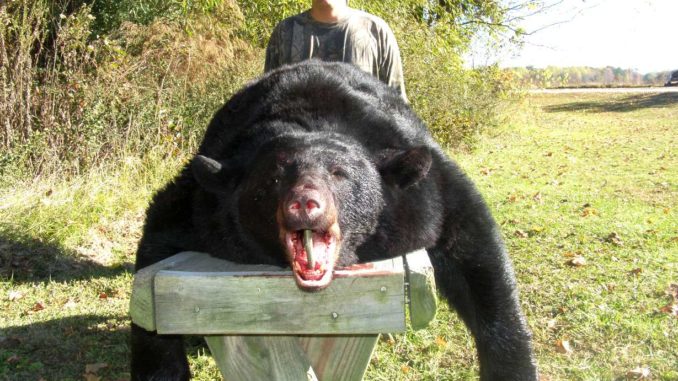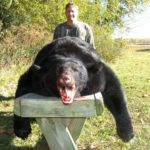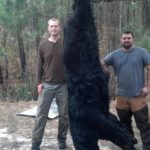
Hunting bears with hounds is a time-honored tradition, and it’s the most-effective way to target North Carolina bears.
Even though black bears are built to survive in just about any environment, they are no match for North Carolina’s bear-hunting battalion, and in December, hunters looking for a real trophy bear should definitely not head for the hills; they should head for eastern North Carolina.
Before this season, the most-effective way to kill a bear was in front of a pack of dogs, and even with changes in laws that opened up bear hunting across the state and allow bears to be baited, traditional hunting with hounds is still tough to beat.
Hunting big-game animals with the help of Fido is nothing new in American culture. Ever since Theodore Roosevelt first wrote in 1893 about hunting on horseback with hounds, hunting with the assistance of dogs changed the way humans pursued big-game species. But the old-fashioned method of tasking small terriers with irritating and distracting big bears long enough for hunters to get a shot is nearly forgotten.
Today, hunters use large packs of hounds to fill their bear tags, first to find and trail them, then to hold them at bay long enough for hunters to get close enough for a killing shot.
The long-legged hounds are bred to pursue these black beasts in the harshest terrains imaginable, and North Carolina has plenty of that in both the mountain and coastal plains. But it is the coastal zone, from the Great Dismal Swamp along the Virginia border to the massive Green Swamp in Brunswick County closer to South Carolina that has sprawling areas of wilderness, pocosins filled with impenetrable gallberry and pine thickets ideal for harboring a strong black bear population and the ultimate locations for releasing a pack of hounds in search of a 400-pound bruin.
Black bears are the state’s largest game species, and according to the N.C. Wildlife Resources Commission, about 20,000 bruins call North Carolina home. occupying roughly 60 percent of its total land area. For years, most of North Carolina’s annual bear harvest has been in the western mountains, but since 1993, the harvest in the coastal plain has surpassed the mountain harvest, and the trend continues to the present.
The higher harvest along the coast is thought to be a direct response to the diehard bear hunters travelling from the mountains to the coast to get a piece of the action. For starters, the coastal plain provides bears with massive agricultural acreage in which to forage near vast thickets of wilderness. Collectively, that creates ideal conditions to grow large, healthy bears.
For Zach Lancaster of Canton, a third-generation bear hunter, the size and quantity of the coastal bears is reason enough for him to trailer his dogs 300 miles from the mountain hollers of Haywood County to the coastal pocosins.
“The bears are 150 pounds heavier along the coast than in the mountains,” Lancaster said. “It is a better breed of bear, with more to eat and thick cover close by.”
Lancaster has hunted bears all over the coast, and it’s December when he heads east and loves every minute of a hunting experience that’s totally different from his normal expeditions in the mountains.
“In the mountains, we rarely hear the chases, because they will run to the next mountain before we can get to them, and it ends up being a long-day hike from mountain top to mountain top. But in the east, we hear the entire chase, which is usually not very long,” Lancaster said.
Chases in the east are typically short compared to the mountains, because in the thick habitat, it doesn’t take bears long to reach places they’ll feel safe, even with a pack of dogs on their trail, closing in.
Finding coastal bears is also much easier. Most of the tracts of lands where Lancaster hunts are leases of large-acreage, timber-company holdings with an extensive road network already in place. They divide up the dense woodlands, allowing hunters like Lancaster to find sign of recent bear activity along the roads.
“A bear is lazy by nature, and they have food, water and cover close together down east. And when we find fresh bear sign crossing a road, the bear is usually just a couple of hundred yards away,” he said.
The afternoon before a hunt, Lancaster and his crew drags the roads clean so they can see fresh crossings the next morning and release the dogs.
Donald Hoggard is another North Carolina native who has carried on a long love affair with bear hunting. Living just a few miles from the historic ferry at Sans Souci in Bertie County, he has hunted bears for more than 40 years and is close to some of the best bear habitat in the state when he steps out of his front door.
For Hoggard, finding a good track around a consistent food source is a good way to find a big bear.
“Corn and soybean fields are good places, but peanut fields are the best. Bears absolutely love peanuts,” he said.
Altogether, bear hunting is a group effort in every realm, from retrieving the bear and handling the dogs to finding a real nice one to chase. Hoggard hunts with a network of hunters on properties all over Bertie and neighboring counties.
“When we or somebody else finds a nice one in their area, we get together and go after the bear,” he said.
While most hunters look for tracks, he hunts with a few men whose dogs are smart enough to pinpoint exactly where to turn out the hounds.
“We can drive the roads with the dogs in the back, and they can smell where the bear has recently crossed,” Hoggard said.
Bear hunting continues to gain popularity in North Carolina, and as long as conditions don’t change radically, hunters will have plenty of bears to chase in the eastern third of the state, according to the N.C. Wildlife Resources Commission. The agency’s records indicate that the population and occupied range in the east and across the state is increasing every year, despite record harvests the past two seasons.
With bear seasons across the eastern part of the state arriving at different times after Thanksgiving on a county-by-county bases, bears had better tighten up, because a brigade of hunters with packs of keen-nosed, strong-willed hounds will soon be on their trail.






Be the first to comment